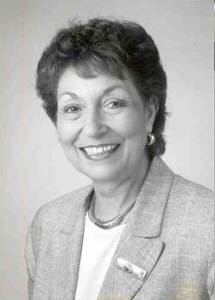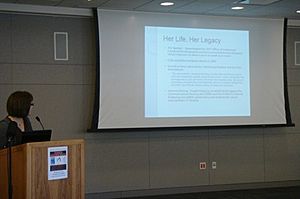Judith Krug facts for kids
Quick facts for kids
Judith F. Krug
|
|
|---|---|

Judith Krug
|
|
| Born |
Judith Fingeret Krug
March 15, 1940 Pittsburgh, Pennsylvania, United States
|
| Died | April 11, 2009 (aged 69) |
| Resting place | Shalom Memorial Park, Arlington Heights, Illinois, United States |
| Other names | Judith Fingeret |
| Alma mater | University of Pittsburgh University of Chicago |
| Occupation | Librarian |
| Years active | 1962–2009 |
| Employer | American Library Association |
| Known for |
|
| Spouse(s) | Herbert Krug |
| Children | 2 |
| Awards | Carl Sandburg Freedom to Read Award Joseph W. Lippincott Award William J. Brennan Award |
Judith Fingeret Krug (March 15, 1940 – April 11, 2009) was an American librarian. She was a strong supporter of freedom of speech and spoke out against censorship. Censorship is when someone tries to control what people can read, see, or hear.
In 1967, Krug became the director of the Office for Intellectual Freedom (OIF) at the American Library Association. This office works to make sure everyone has access to information. She also helped start the Freedom to Read Foundation in 1969.
One of her most famous achievements was co-founding Banned Books Week in 1982. This event celebrates the freedom to read and highlights books that have been challenged or removed from libraries and schools.
Krug also fought against laws that tried to limit what people could see online. She opposed the Communications Decency Act of 1996, which was the first attempt by the U.S. government to censor the Internet. She believed libraries should offer all kinds of materials without judgment.
She also worked to protect the privacy of library users. When the government tried to access private library records using the USA PATRIOT Act of 2001, Krug spoke out against it. She also led the effort to challenge the Children's Internet Protection Act in 2003. This law required public libraries to use filters on their computers. Thanks to her efforts, the Supreme Court of the United States ruled that adults could ask for these filters to be turned off.
Contents
Judith Krug's Early Life and Education
Judith Fingeret Krug was born in Pittsburgh, Pennsylvania, on March 15, 1940. Her interest in freedom of speech started when she was young. She remembered reading a book about health topics with a flashlight under her covers at age 12. When her mother found her, she told Judith to turn on the light so she could read properly. This showed Judith that her mother supported her right to read.
Krug went to the University of Pittsburgh and earned a Bachelor of Arts degree in 1962. She then studied at the University of Chicago and received a Master of Arts degree in library science. She married Herbert Krug in 1964. They had two children and five grandchildren.
Judith Krug's Library Career
Leading the Office for Intellectual Freedom
Krug started her library career in 1962 as a reference librarian in Chicago. In 1965, she began working for the American Library Association (ALA). In 1967, she became the first director of the ALA's Office for Intellectual Freedom (OIF).
The OIF's main goal was to protect the right of people in the U.S. to get all kinds of information. This was true even if some people disagreed with the information.
As director, Krug helped publish a newsletter that shared stories of censorship in the U.S. It also gave ideas on how to fight against these attempts to limit free speech. She oversaw the creation of the Intellectual Freedom Manual and the Newsletter on Intellectual Freedom. She also helped organize Banned Books Week.
In 1969, Krug also became the first head of the Freedom to Read Foundation. This group works alongside the OIF. Its purpose is to protect the First Amendment to the United States Constitution, which guarantees freedom of speech. It also helps with legal defense for people whose freedom to read is challenged.
Fighting Against Library Censorship

Judith Krug strongly believed that libraries should not censor the materials they offer. She supported laws that kept library use records private. When the United States Department of Justice used the USA PATRIOT Act of 2001 to look at private library databases, Krug spoke out. She created a public protest against this government action.
She also led the challenge against the Children's Internet Protection Act in 2003. This law required public libraries to use internet filters on their computers. Krug argued that these filters were not perfect. She warned they might block important educational information about social issues and health.
Krug served on many important boards and committees. These included the Board of Directors of the Center for Democracy and Technology. She also judged for the PEN/Newman's Own First Amendment Award. This award honors people who defend freedom of expression.
Death and Memorial
Judith Krug passed away on April 11, 2009, at age 69. She had been battling stomach cancer.
After her death, the American Library Association created the Judith F. Krug Memorial Fund. This fund helps make sure that Banned Books Week continues every year. The 2010 edition of the Intellectual Freedom Manual was dedicated to her memory.
Awards and Honors
Judith Krug received many awards for her work protecting freedom of speech and access to information. Some of these include:
- 1976: Irita Van Doren Award from the American Booksellers Association.
- 1976: Harry Kalven Freedom of Expression Award from the American Civil Liberties Union.
- 1978: Robert B. Downs Intellectual Freedom Award from the University of Illinois at Urbana-Champaign.
- 1983: Carl Sandburg Freedom to Read Award from the Friends of the Chicago Public Library. This award honors those who stand against censorship.
- 1998: Joseph W. Lippincott Award from the American Library Association. This is considered a very high honor in the library profession.
- 2005: Doctor of Humane Letters (an honorary doctorate) from the University of Illinois at Urbana-Champaign.
- 2009: William J. Brennan Award from the Thomas Jefferson Center for the Protection of Free Expression. She was recognized for supporting open-mindedness and free access to books.
 | Shirley Ann Jackson |
 | Garett Morgan |
 | J. Ernest Wilkins Jr. |
 | Elijah McCoy |

